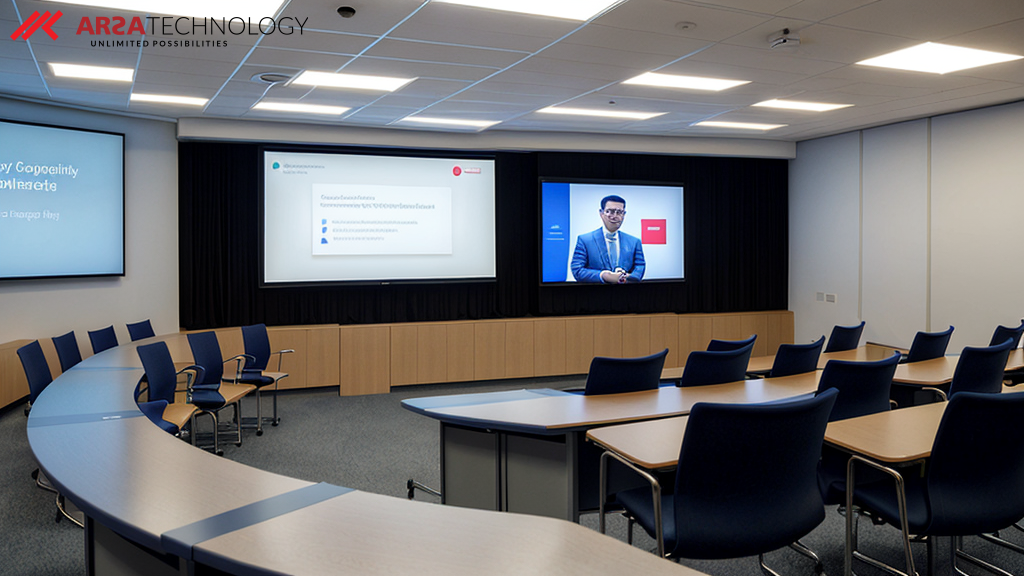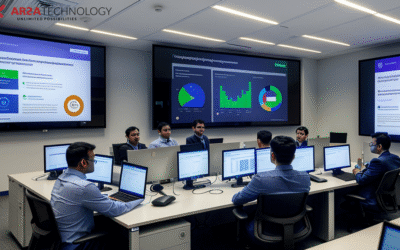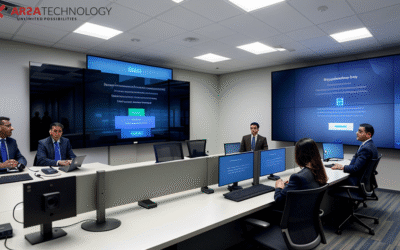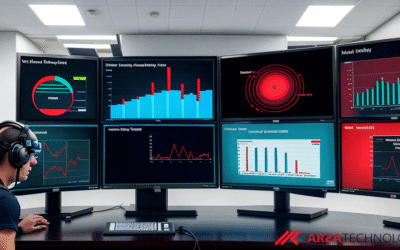Introduction: Overcoming Content accessibility for disabled students in the education industry
In an increasingly digital world, access to information is paramount. Yet, for many disabled students, particularly those with hearing impairments or certain learning disabilities, the spoken word in lectures, seminars, and critical meetings remains a significant barrier to equitable education. Traditional methods of providing accommodations, such as manual transcription or sign language interpreters, are often resource-intensive, slow, and not always scalable to the dynamic needs of modern educational institutions. This creates a pressing challenge: how can we ensure that every student, regardless of their abilities, has immediate and comprehensive access to vital academic content?
ARSA Technology is at the forefront of addressing this critical pain point with its advanced Speech-to-Text API. By transforming spoken language into accurate, searchable text in real-time or from recorded audio, our solution empowers educational institutions to build truly inclusive learning environments. This article explores how developers and solutions architects can leverage ARSA’s powerful voice to text API to implement automated meeting transcription, enhancing content accessibility, driving operational efficiency, and ultimately fostering a more equitable educational experience for all.
The Imperative for Inclusive Learning Environments
The call for inclusive education is not merely an ethical consideration; it’s a legal and societal mandate. Disabled students deserve the same opportunities to learn, participate, and succeed as their peers. When lectures, group discussions, and administrative meetings are primarily auditory, students who struggle with auditory processing, have hearing loss, or are non-native speakers are at a distinct disadvantage. They may miss crucial information, struggle to keep up with the pace of discussion, or be unable to revisit key points for revision.
Manual transcription, while a solution, is often prohibitively expensive and time-consuming. The delay between an event and the availability of a transcript can render it less effective for real-time learning or immediate comprehension. Furthermore, the quality can vary significantly, impacting accuracy and reliability. Educational institutions are thus searching for scalable, cost-effective, and highly accurate solutions to bridge this accessibility gap, ensuring that every spoken word becomes an accessible, actionable piece of information.
Transforming Sound into Insight: The Power of Speech-to-Text
At its core, Speech-to-Text (STT) technology converts spoken language into written text. This seemingly simple process unlocks a world of possibilities for accessibility. For disabled students, it means:
- Real-time Captions: Lectures and meetings can be live-captioned, allowing students to read along as the speaker talks.
- Searchable Transcripts: Recorded content can be instantly transcribed, creating searchable documents that students can review at their own pace, highlight key sections, and easily find specific information.
- Enhanced Comprehension: Visual text can aid comprehension for students with auditory processing disorders or those who benefit from multi-modal learning.
- Language Support: For non-native speakers, transcripts can be a vital tool for understanding complex academic language.
The impact extends beyond individual students, benefiting the entire institution by creating a richer, more accessible repository of knowledge.
ARSA Technology’s Speech-to-Text API: A Foundation for Accessibility
ARSA Technology offers a robust and highly accurate transcription API designed for enterprise-grade applications. Our Speech-to-Text API is engineered to deliver exceptional performance, making it an ideal choice for the demanding environment of education. Here’s why it stands out:
- Unparalleled Accuracy: The cornerstone of any effective transcription solution is accuracy. ARSA’s API leverages advanced AI models to minimize errors, even in challenging audio environments, ensuring that transcripts faithfully represent the spoken content.
- Multilingual Capabilities: In today’s globalized educational landscape, supporting multiple languages is crucial. Our multilingual STT API can accurately transcribe speech across a wide array of languages, catering to diverse student populations and international academic collaborations. This capability is vital for institutions with students from various linguistic backgrounds or those offering courses in multiple languages.
- Scalability and Reliability: Educational institutions generate vast amounts of audio content daily, from short student queries to multi-hour lectures. ARSA’s infrastructure is built for scale, capable of processing large volumes of audio efficiently and reliably, ensuring consistent performance even during peak demand.
- Ease of Integration: While we won’t delve into code, it’s important to note that our API is designed with developers in mind, offering a straightforward path to integrate powerful speech recognition capabilities into existing learning management systems (LMS), virtual meeting platforms, or custom educational applications. This allows engineering teams to rapidly deploy solutions without extensive specialized knowledge in AI/ML. To see the API in action and understand its capabilities, demo the Speech-to-Text API. This interactive playground provides a hands-on experience of how our voice to text API processes audio.
By choosing our highly accurate transcription API, institutions gain a powerful tool that not only addresses accessibility but also enhances the overall learning experience.
Beyond Automated Meeting Transcription: Expanding Educational Impact
While automated meeting transcription is a primary use case for solving content accessibility, the applications of ARSA’s Speech-to-Text API in education extend far wider:
- Lecture and Seminar Transcription: Automatically generating transcripts for all recorded lectures, making them searchable and reviewable for all students, especially beneficial for revision and self-paced learning.
- Student Support Services: Transcribing student-teacher consultations, academic advising sessions, or even student-generated content for peer review, providing a detailed record and improving feedback mechanisms.
- Research and Qualitative Analysis: Researchers can use the API to transcribe interviews, focus groups, and field recordings, significantly speeding up the qualitative data analysis process.
- Content Creation: Educators can dictate notes, assignments, or even entire lessons, which are then automatically converted into text, streamlining content development.
- Language Learning: For language students, the API can be integrated into tools that provide immediate feedback on pronunciation by comparing spoken words to correct text.
These diverse applications underscore the versatility of a robust speech recognition API as a foundational technology for innovation within the education sector.
From Zero to Hero: A Developer’s Path to Impact with ARSA
For software developers and solutions architects in education, the journey from identifying the accessibility pain point to deploying a transformative solution can be remarkably efficient with ARSA Technology. Our focus is on providing a powerful, ready-to-use API that abstracts away the complexities of underlying AI models. This means your team can concentrate on building innovative educational applications rather than spending valuable time on core speech recognition research and development.
The conceptual integration process involves sending audio data to our API and receiving accurate text back. This straightforward interaction allows for rapid prototyping and deployment. Whether you’re enhancing an existing LMS or developing a new platform, the ARSA voice recognition SDK (Software Development Kit, conceptually) facilitates a smooth integration, enabling your institution to become an accessibility leader. The “how to use Speech-to-Text API” becomes less about deep AI expertise and more about leveraging a proven, high-performance service.
Strategic Advantages and ROI for Educational Institutions
Investing in ARSA Technology’s Speech-to-Text API offers significant returns beyond just compliance and ethical responsibility:
- Enhanced Reputation and Brand Value: Institutions known for their commitment to inclusivity attract a wider, more diverse student body and faculty.
- Operational Cost Savings: Automating transcription eliminates the high costs associated with manual transcription services, freeing up budget for other critical initiatives.
- Improved Learning Outcomes: Providing accessible content directly contributes to better student engagement, comprehension, and academic performance.
- Competitive Edge: Institutions that proactively adopt advanced AI solutions for accessibility and efficiency position themselves as leaders in educational innovation.
- Future-Proofing: As digital learning evolves, having a robust transcription API in place ensures adaptability to new formats and demands.
- Data-Driven Insights: Transcripts can be analyzed to identify trends in student questions, common misconceptions, or areas where teaching methods could be improved.
When considering Speech-to-Text API pricing, it’s crucial to evaluate the total value proposition, including accuracy, scalability, and the strategic advantages gained. ARSA Technology is committed to providing transparent and competitive pricing models that align with the needs of educational institutions of all sizes.
Furthermore, integrating speech-to-text capabilities can open doors to other advanced AI applications. Imagine combining accurate transcription with the ability to generate natural voice responses with our TTS API, creating interactive learning modules or personalized AI tutors that can both understand and speak to students. This synergistic approach amplifies the impact of individual AI components.
Conclusion: Your Next Step Towards a Solution
The challenge of content accessibility for disabled students in education is significant, but the solution is within reach. ARSA Technology’s Speech-to-Text API offers a powerful, accurate, and scalable path to transforming spoken content into accessible, actionable text. By embracing automated meeting transcription and broader STT applications, educational institutions can not only meet their accessibility mandates but also foster a more inclusive, efficient, and innovative learning environment for every student.
The journey from identifying a pain point to becoming a hero of accessibility and innovation is streamlined with ARSA’s developer-friendly solutions. We invite you to explore the capabilities of our Speech-to-Text API and discover how it can empower your institution to build the future of inclusive education.
Ready to Build with ARSA Technology?
Start integrating our powerful APIs today. Get your free API key, explore the interactive documentation, and see how quickly you can bring your project to life.







